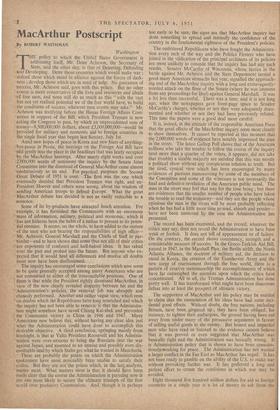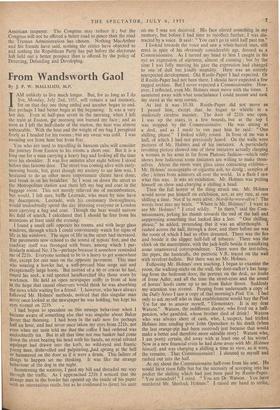MacArthur Postscript
By ROBERT WAITHMAN
THE policy to which the United States Government is addressing itself, Mr. Dean Acheson, the Secretary of State, said the other day, is that of Deterring, Defending 1111°° and Developing. Deter those countries which would make war ; defend those which stand in alliance against the forces of dark- ness ; develop those which are in need of help. No guarantee of success, Mr. Acheson said, goes with this policy. But no other course is more conservative of the lives and resources and ideals f free men, and none will do as much as this " with the vast but not yet realised potential we of the free world have, to build the conditions of success, whatever turn events may take." Mr. Acheson was testifying before the House Foreign Affairs Com inittee in support of the Bill, which President Truman is now asking the Congress to pass, by which an unprecedented sum of money-8,500,000,000 dollars, about £3,000,0001000—would be provided for military and economic aid to foreign countries in the single fiscal year that began last Sunday, July 1st.
Amid new hopes of peace in Korea and new fears of anything- but-peace in Persia, the hearings on the Foreign Aid Bill have ' 'slid gently into the place in the headlines that was lately occupied by the MacArthur hearings. After nearly eight weeks and over 2,000,000 words of testimony the inquiry by the Senate Joint . , Committee into the dismissal of General MacArthur came almost unobtrusively to its end. For practical purposes the Second Great Debate of 1951 is over. 'the first was the one which eventually decided that President Truman was right, and ex- President Hoover and others were wrong, about the wisdom of sending American troops to defend. Europe. What the great MacArthur debate has decided is not as easily reducible to a sentence. . Some of its by-products have attracted much attention. For 'example, it has furnished the Communists with an enormous mass of information, military, political and economic, which it ' has not hitherto been the habit of a nation to present to its poten- tial enemies. It seems, on the whole, to have added to the stature of the men' who are bearing the responsibilities of high office— Mr. Acheson, General Marshall and the Chiefs of Staff in par- ticular—and to have shown that some (but not all) of their critics arc exponents of confused and half-baked ideas. It has raked over the past and probed into the future. But anyone who ex- pected that it would heal all differences and resolve all doubts imust now have been disillusioned. The inquiry has encouraged some conclusions which now seem ,, on doubts which the Republicans have long nourished and which to be quite generally accepted among many Americans who are not committed to either of the irreconcilable positions. One of them is that while the President rightly dismissed MacArthur, in view of the now clearly revealed disparity between his and the Administration's policies, the removal job was abruptly and clumsily performed. Another and rather vague view, which rests the inquiry has not been able to remove, is that the Administra- tion might somehow have saved Chiang Kai-shek and prevented the Communist victory in China in 1946 and 1947. Many i' Americans now believe this, without having any clear idea just what the Administration could have done to accomplish this desirable objective. A third. conclusion, springing mainly from hindsight, is that at Yalta President Roosevelt and his Adminis- tration were over-anxious to bring the Russians into the war against Japan, and assented to an unwise and possibly even dis- creditable deal by which Stalin got what he wanted in Manchuria. These are probably the points on which the Administration spokesmen have most noticeably been unable to satisfy their critics. But they are not-the points which, in the_ last( analysis, matter most. What matters most is that it should have been made clear that the course the Administration is pursuing now is the one most likely to secure the ultimate triumph of the free world over predatory Communism. And, though it is perhaps too early to be sure, the signs are that MacArthur inquiry has done something to spread and intensify the confidence of the country in the fundamental rightness of the President's policies.
The embittered Republicans who have fought the Administra- tion every inch of the way and the Politics Firsters who have joined in the vilification of the principal architects of its policies are most unlikely to concede that the inquiry has had any such results. Senator McCarthy of Wisconsin, whose tactics in the battle against Mr. Acheson and the State Department turned a good many American stomachs last year, signalled the approach- ing end of the MacArthur inquiry with a long and extravagantly- worded attack on the floor of the Senate (where he was immune from any proceedings for libel) against General Marshall. It was a lot less than successful. There was a time, and it is not long ago, when the newspapers gave front-page space to Senator McCarthy's charges, whether or not they were adequately docu- mented and whether or not they had been previously refuted. This time the papers were a good deal more careful.
It is, indeed in the attitude of the responsible Americann. Press that the good effects of the MacArthur inquiry seem most clearly to show themselves. It cannot be reported at this moment that the 2,000,000 words of evidence have notably impressed the man in the street. The latest Gallup Poll shows. that of the American millions who take the trouble to follow the course of the inquiry (and more than a quarter of the voters, it appears, did not take that trouble) a sizable majority are satisfied that this was mostly a political show without any conspicuous relation to truth. But the tired, cynical view which has been encouraged by many evidences of partisan manoeuvring by some of the members of the Committee and some of the witnesses is not necessarily the final and definitive revelation of the American public mind. The man in the street may feel that way for the time being ; but there are evidences that the smaller number of people who have taken the trouble to read the testimony—and they are the people whose opinions the man in the street will be most probably reflecting when he has had a little more time to read, absorb and ponder— have not been unmoved by the case the Administration has presented.
The record has been examined, and the record, whatever the critics may say, does not reveal the Administration to have been weak or foolish. It does not tell of appeasement or of failure. On the contrary, the record shows consistency, strength and a considerable measure of success. In the Greco-Turkish Aid Bill, passed in 1947, in the Marshall Plan, the Berlin airlift, the North Atlantic Alliance, the doctrine of military aid, the decision to stand in Korea, the creation of the Eisenhower Army and the new surge of rearmament through the free world, there is a pattern of creative statesmanship the accomplishments of which have far outweighed the mistakes upon which the critics have concentrated. All in all, the Truman Administration has done pretty well. It has transformed what might have been disastrous defeat into at least the prospect of ultimate victory.
The supporters of MacArthur and his policy may be entitled to claim that the enunciation of his ideas have had some inci- dental good effects. Without doubt, the free nations, including Britain, have been gingered up ; they have been obliged, for instance, to tighten their embargoes, the ground having been cut away from under many of the persuasive arguments in favour of selling useful goods to the enemy. But honest and impartial men who have read or listened to the evidence cannot believe that it was proved or even suggested that MacArthur was basically right and the Administration was basically wrong. It is Administration policy that is shown to have been conscien- tiously-working for peace. The Administration has not wanted a larger conflict in the Far East as MacArthur has urged. It has not been ready to gamble on the ability of the U.S. to make war without provoking further war. It has preferred a long and patient effort to create the conditions in which war may be avoided.
Eight thousand five hundred million dollars for aid to foreign countries in a single year is a lot of money to ask from the American taxpayer. The Congress may reduce it ; but the Congress will not be offered a better road to peace than the road the Truman Administration has chosen. Nothing MacArthur and his friends have said, nothing the critics have objected to and nothing the Republican Party has put before the electorate ha% held out a better prospect than is offered by the policy of Deterring, Defending and Developing.























































 Previous page
Previous page